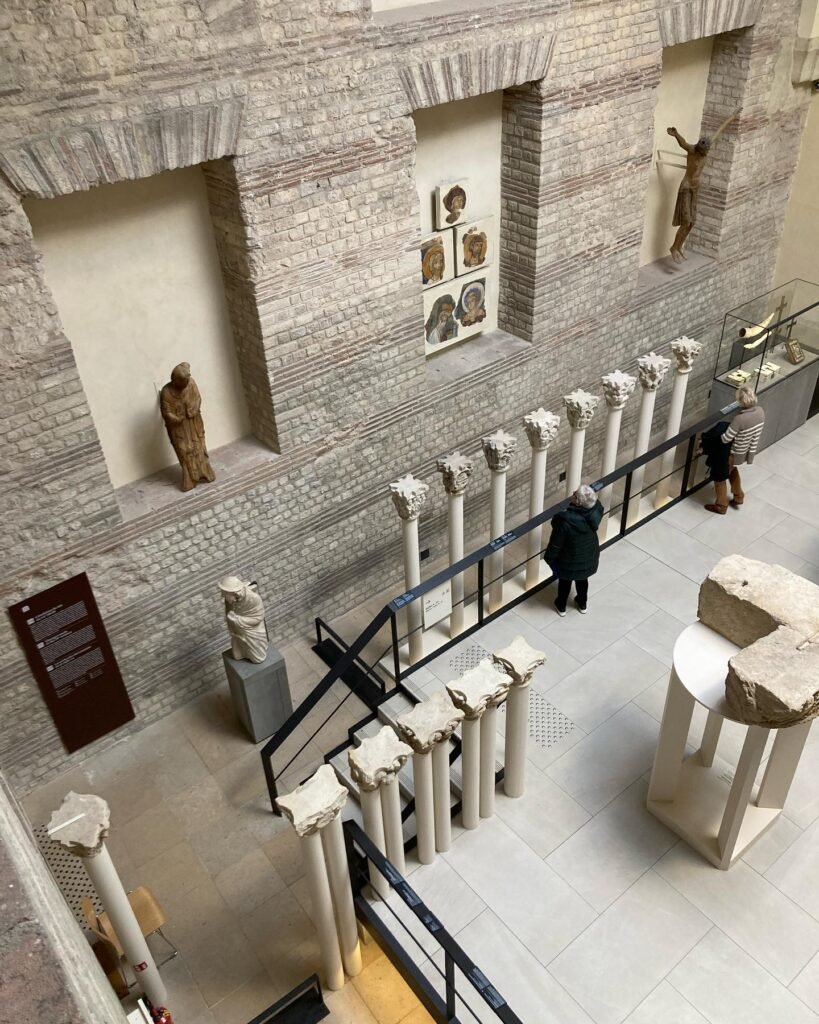I have visited Paris six times and France more than that. I am very familiar with the language barrier issues in Paris and throughout France.
During my first and even my second visit, I faced many challenges due to the language barrier. These experiences prompted me to ask myself numerous questions about the French language and how to overcome these obstacles.

Decided to find solutions, I embarked on a journey to unlock the language barrier. Through time and effort, I successfully navigated this challenge.
Drawing from my experiences, I am writing this article to address all your questions and concerns about the language barrier in Paris and France. I aim to provide practical tips and solutions to help you overcome any language difficulties you may encounter during your travels.
Whether you’re a first-time visitor or a seasoned traveler, this guide will equip you with the knowledge and strategies you need to communicate effectively and enjoy your time in France. Let’s dive into the insights and techniques that can make your French experience smoother and more enjoyable. But at first I’m going to answer your all questions.
Don't worry! Read it shortly if you don't have enough time.
ToggleWhat Language Do They Speak in Paris?
When you visit Paris, the primary language you’ll hear is French. French is the official language of France. It’s the language spoken in government offices, schools, on television, and in everyday conversations.
In Paris, you’ll hear French everywhere – from the friendly chatter in cafes and the informative tours in museums to the shopkeepers greeting you in boutiques and the casual conversations on the streets. It’s a beautiful, melodic language that adds to the charm of the city.
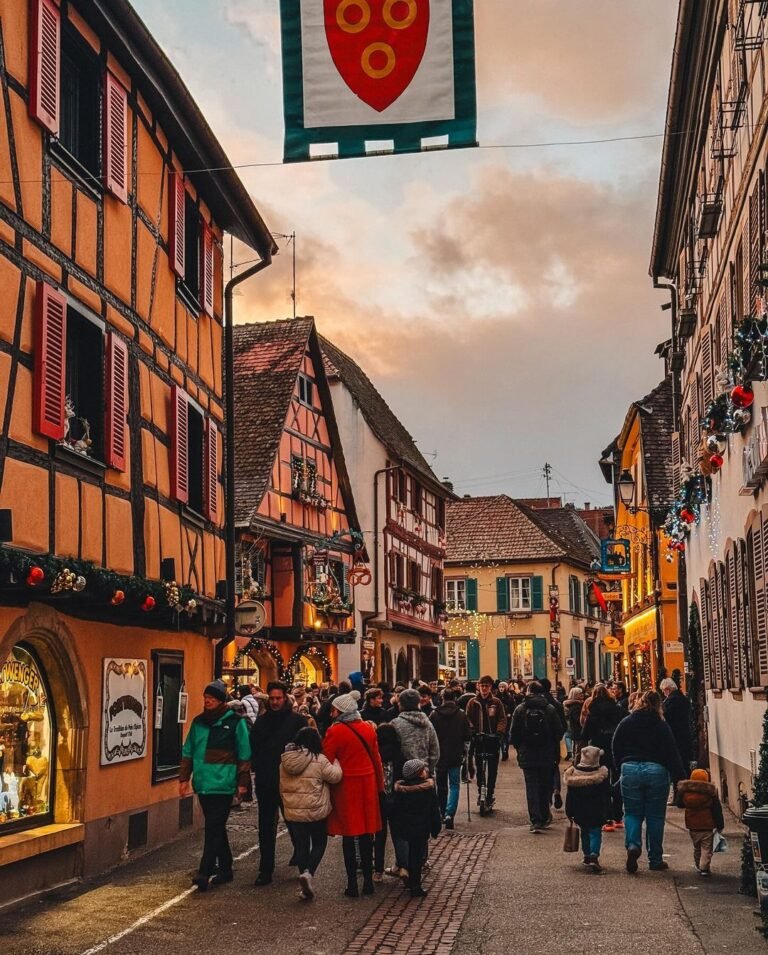
While many Parisians do speak English, especially in tourist areas, learning a few basic French phrases can enhance your visit. Simple greetings like “Bonjour” (hello) and “Merci” (thank you) go a long way and are often appreciated by locals.
What are the Top 3 Languages Spoken in Paris?
| Language | Percentage | Estimated Number of People |
|---|---|---|
| French | 88% | 59.2 million |
| English | 39% | 26.1 million |
| Other | 13% | 8.7 million |
French
As the primary language, French is the heartbeat of Paris, spoken by almost everyone. Whether you’re ordering a croissant in a quaint bakery or navigating the metro, a basic understanding of French phrases can go a long way.
English
Paris, being a global hub and a top tourist destination, sees a lot of English speakers. You’ll often find English spoken in hotels, restaurants, and popular tourist spots, making it easier for visitors to explore the city. Many Parisians, especially in the service industry, are fluent in English, which can be a great relief for travelers.
Spanish
The close proximity to Spain and the vibrant Spanish-speaking community in Paris make Spanish another commonly heard language. From lively Latin bars to cultural festivals, the Spanish influence adds a rich layer to the city’s multicultural vibe.
Can You Get by Speaking English in Paris?
Absolutely, you can navigate Paris quite comfortably speaking English, especially in popular tourist areas and when interacting with younger Parisians.
You’ll find that in hotels, restaurants, museums, and shops, staff are generally prepared to assist English-speaking visitors with directions, menus, and other common needs.
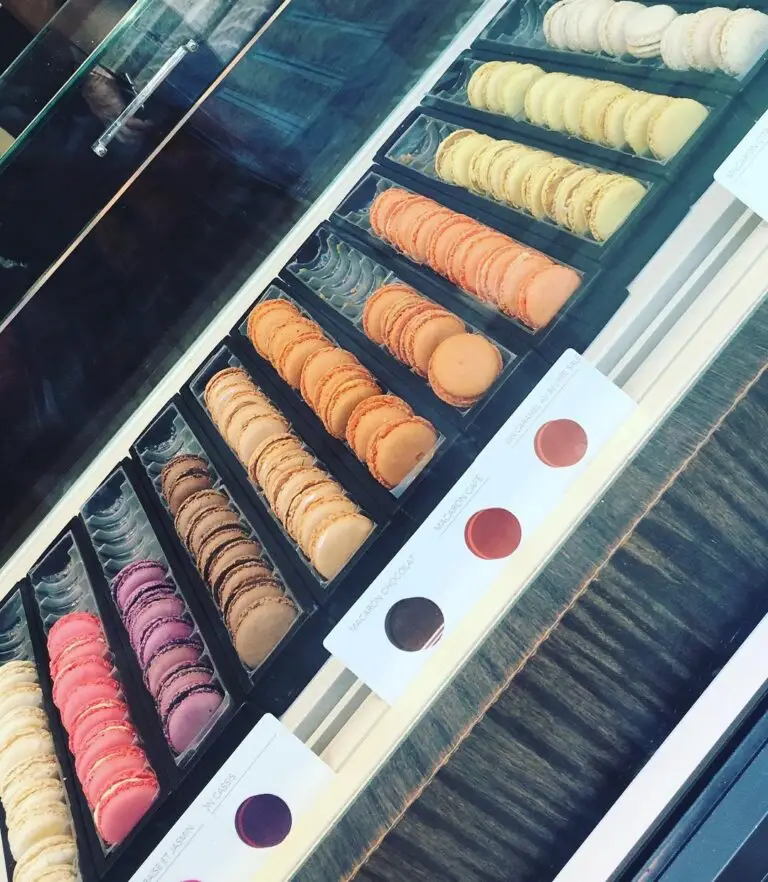
That said, trying out a few French phrases, like “bonjour” (hello), “s’il vous plaît” (please), and “merci” (thank you), can make a big difference. Not only does it show respect for the local culture, but it also tends to create warmer interactions with locals.
During my visits to Paris, I’ve found that even a simple “Excusez-moi, parlez-vous anglais?” (Excuse me, do you speak English?) often leads to a more pleasant and helpful response. It’s a small gesture that can enhance your experience in this beautiful city.
Learn about Paris zip codes and Paris postal codes.
Do You Need to Speak French in Paris?
While you can get by without speaking French, knowing some of the language can greatly improve your experience in Paris.
Basic French phrases like “bonjour” (hello), “merci” (thank you), and “où est…?” (where is…?) can be incredibly helpful for navigating the city, especially in less touristy areas.
In places like local markets, small cafés, and neighborhood shops, French is often the primary language spoken, and even a little effort to communicate in French is appreciated by locals.
During my trips to Paris, I’ve found that locals are generally more open and friendly when they see you’re trying to speak their language, even if it’s just a few words. It shows respect and curiosity, making your journey through the city even more rewarding.
Should I Speak Spanish or English in Paris?

If you have to choose between Spanish and English in Paris, English is generally the most useful language. English is widely understood and spoken, especially in tourist-centric areas like museums, hotels, restaurants, and shops.
Many Parisians, particularly those working in the tourism and service industries, can communicate effectively in English, making it a convenient option for travelers.
While Spanish is spoken by a segment of the population, particularly in certain neighborhoods with a strong Spanish-speaking community, it is not as universally understood as English.
If you’re looking for the most practical language for communication, especially if you don’t speak French, English will likely be your best bet. That said, if you do speak Spanish and find yourself in a situation where it’s needed, it can still be a helpful tool. However, for navigating the city as a whole, English is the more reliable choice.
What Accent is in Paris?
In Paris, you’ll primarily hear the standard French accent, commonly known as “Parisian French.” This accent is considered the standard in France and is the version most commonly taught in French language courses around the world.
Parisian French is characterized by its clear and precise pronunciation, making it relatively accessible for French learners. It’s often viewed as the “neutral” accent in the country, without the strong regional variations you might encounter in other parts of France.
When you’re in Paris, listening to the local accent can be a great way to improve your French listening skills.
The pronunciation tends to be straightforward, with less regional slang or dialectal variation, which can be particularly helpful for those trying to learn or practice the language.
Whether you’re chatting with a shopkeeper, listening to announcements on the metro, or enjoying a conversation at a café, you’ll mostly encounter this standard Parisian accent.
Should Americans Try to Speak French in France?
Absolutely! When Americans (or any non-French speakers) make an effort to speak French in France, it’s often met with appreciation and respect from the locals.
Even if you only know a few basic phrases like “bonjour” (hello), “s’il vous plaît” (please), and “merci” (thank you), attempting to use the local language shows a willingness to engage with the culture and respect the local customs.
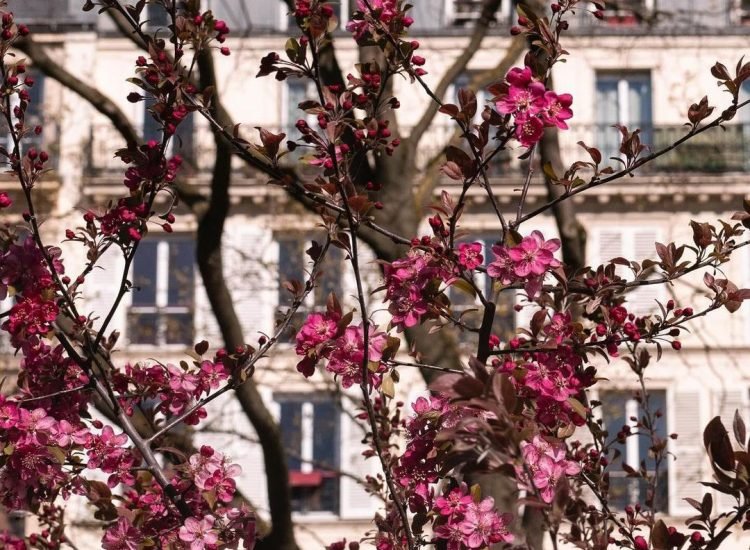
Don’t worry about making mistakes—most Parisians are understanding and patient with those who are trying to speak French. They often appreciate the effort more than perfect pronunciation.
In my experience, even a simple “Excusez-moi, parlez-vous anglais?” (Excuse me, do you speak English?) can make a big difference in how you are received.
It sets a positive tone for the interaction and often leads to more helpful and friendly exchanges. Plus, trying out some French can make your travel experience more immersive and rewarding!
Is It Easy to Learn French?
Learning French can be a rewarding experience, but it does come with its challenges, especially for English speakers. The grammar rules, pronunciation, and some vocabulary can be quite different from English, which might feel tricky at first.
However, with dedication and consistent practice, it’s definitely manageable.
Starting with basic phrases and gradually expanding your vocabulary is a great approach. Many people find it helpful to engage themselves in the language through online resources, language apps, and classes.
Watching French movies, listening to French music, and practicing with native speakers can also accelerate your learning and make the process more enjoyable.
While it might take some time to get comfortable with the language, the effort is worth it.
Easy French Phrases
Here are some basic French phrases that can be quite useful during your trip:
Bonjour (Hello/Good morning)
Merci (Thank you)
S’il vous plaît (Please)
Excusez-moi (Excuse me)
Parlez-vous anglais? (Do you speak English?)
Combien ça coûte? (How much does it cost?)
Où est…? (Where is…?)
Je voudrais… (I would like…)
These simple phrases can help you navigate common situations, make polite requests, and start conversations. They also show respect for the local language and can enhance your experience by making interactions smoother and more enjoyable.
Don’t worry about getting everything perfect—most people appreciate the effort!
Language Etiquette in Paris
When interacting with Parisians, following some simple etiquette tips can make your experience more pleasant and respectful:
- Greet with “Bonjour” or “Bonsoir”
- Use “Vous” instead of “Tu”
- Thank and Smile: Say “merci”
- Apologize When Necessary: Use “Excusez-moi”
- Ask for English Politely: “Excusez-moi, parlez-vous anglais?”
- Avoid Raising Your Voice: Speak at a moderate volume
- Be Patient with Language Barriers
- Pay Attention to Non-Verbal Cues
- Polite Goodbyes: Say “Au revoir” or “Bonne journée”
- Be Mindful of Personal Space
- Avoid Sensitive Topics
Greet with “Bonjour”: Always begin with a polite greeting like “Bonjour” (hello/good morning). This small gesture sets a friendly tone and is an important part of French culture. If it’s evening, use “Bonsoir” (good evening).
Use “Vous” instead of “Tu”: When addressing strangers or in formal situations, use the formal “vous” instead of the informal “tu.” This shows respect and politeness. “Vous” is the appropriate form when speaking to someone you don’t know well, someone older, or in professional settings.
Thank and Smile: Express gratitude by saying “merci” (thank you) and offering a friendly smile. Politeness is highly valued, and small gestures like thanking someone can go a long way in creating positive interactions.
Apologize When Necessary: If you bump into someone or need to get someone’s attention, use “Excusez-moi” (excuse me) to apologize or politely interrupt.
Ask for English Politely: If you need to switch to English, it’s courteous to ask first. You can say, “Excusez-moi, parlez-vous anglais?” (Excuse me, do you speak English?) before continuing in English. This shows respect for their language and acknowledges that you’re in their country.
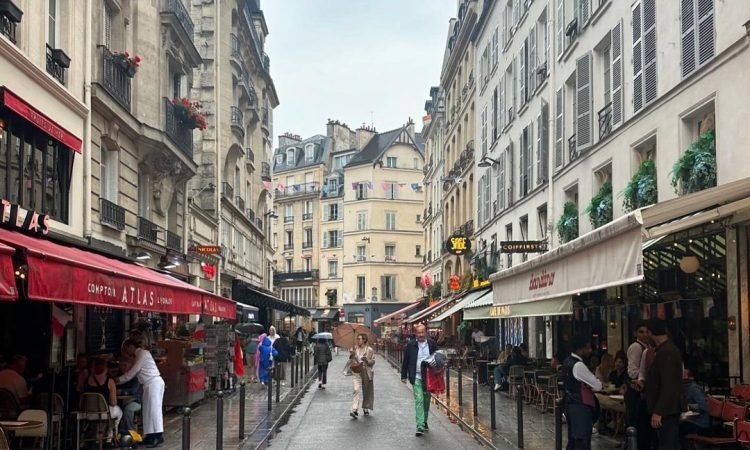
Avoid Raising Your Voice: In general, French people speak at a moderate volume in public places. Keeping your voice at a reasonable level is seen as respectful and considerate.
Be Patient with Language Barriers: If you’re speaking French and the conversation gets challenging, be patient. Many Parisians appreciate your effort to speak their language, even if you’re not fluent. They may switch to English to help, but continuing to show effort and patience is appreciated.
Non-Verbal Cues: French people often use subtle non-verbal cues. For example, a slight nod or a small smile can indicate agreement or politeness. Paying attention to these cues can help you navigate conversations more smoothly.
Polite Goodbyes: When leaving a shop, restaurant, or ending a conversation, it’s polite to say “Au revoir” (goodbye) or “Bonne journée” (have a good day). This shows respect and leaves a positive impression.
Be Mindful of Personal Space: While Parisians can be warm and friendly, they also value personal space. Avoid overly familiar gestures like hugging or touching unless you have a closer relationship with the person.
Avoid Discussing Sensitive Topics: Like in many cultures, it’s wise to avoid bringing up sensitive topics such as politics, religion, or personal finances in casual conversation, especially with people you’ve just met.
By following these etiquette tips, you’ll likely find Parisians to be friendly and accommodating, making your interactions more enjoyable and culturally enriching.
How to Improve Your French Before Traveling
Improving your French before traveling to Paris can greatly enhance your experience. Here are some effective ways to boost your language skills:
- Language Apps: Duolingo, Babbel, Rosetta Stone
- Watch French Films: With subtitles
- Listen to French Music and Podcasts: Focus on genres/topics you enjoy
- Join Language Groups: Local or online exchange groups
- Take a Course: Community college, language school, online
- Practice Speaking: With partners, tutors, or self-talk
Language Apps: Use language-learning apps like Duolingo, Babbel, or Rosetta Stone for daily practice. These apps are user-friendly and can help you build vocabulary and grammar skills in a fun, interactive way.
Watch French Films: Watching French films with subtitles can help you get familiarized with the sound and rhythm of the language. It also helps you pick up useful phrases and cultural nuances. Try watching popular French movies or TV shows to immerse yourself in the language.
Watching films in French helped me see familiar stories in a new light and improved my listening skills. I remember watching “Le Roi Lion” and being amazed at how well the French dubbing captured the original’s magic.
It was a fun way to learn new words and phrases while enjoying classic films I already loved.
Listen to French Music and Podcasts: Listening to French music or podcasts can improve your listening skills and pronunciation. Choose genres or topics that interest you to make the experience enjoyable.
Join Language Groups: Find local language exchange groups or online communities where you can practice speaking French with native speakers or fellow learners. Platforms like Meetup or language exchange websites can connect you with others looking to practice.
Take a Course: Enroll in a French course at a community college, language school, or online platform. Structured lessons with a teacher can provide a more comprehensive understanding of grammar, vocabulary, and pronunciation.
Practice Speaking: Practice speaking French as much as possible, even if it’s just basic phrases. You can do this with language partners, tutors, or even by talking to yourself. The more you practice, the more confident you’ll become.
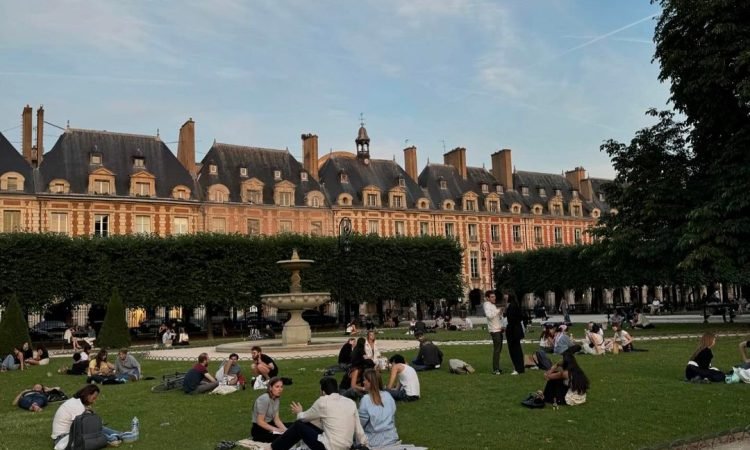
Language Challenges for Non-French Speakers
Navigating Paris as a non-French speaker can come with its hurdles, but with a bit of preparation, these challenges can be managed:
- Fast-Paced Conversations: Catch keywords; ask for clarification
- Accents: Be patient; request simple explanations
- Menus and Signs: Use translation apps
Understanding Fast-Paced Conversations: Parisians often speak quickly, especially in lively settings like cafés or markets.
I remember my first experience trying to keep up with a conversation in a bustling Parisian bistro. It felt like everyone was speaking in fast-forward! Taking a deep breath and catching keywords helped, and I found that locals were patient when I asked for clarification.
Dealing with Accents: While the Parisian accent is relatively clear, you might encounter various French accents that can be tricky.
For instance, when I visited a small wine shop, the owner’s strong regional accent made it hard to understand some of the details about different wines. It was a bit of a puzzle, but he was patient and used simple terms when he realized I was struggling.
Navigating Menus and Signs: Menus and signs are usually in French, which can be overwhelming if you’re not familiar with the language.
Most Parisians are understanding and appreciate any effort you make to speak French. Carrying a pocket dictionary or using a translation app can be a lifesaver and make these challenges easier to handle.
With a bit of preparation and a positive attitude, you’ll find that these minor hurdles are just part of the adventure!
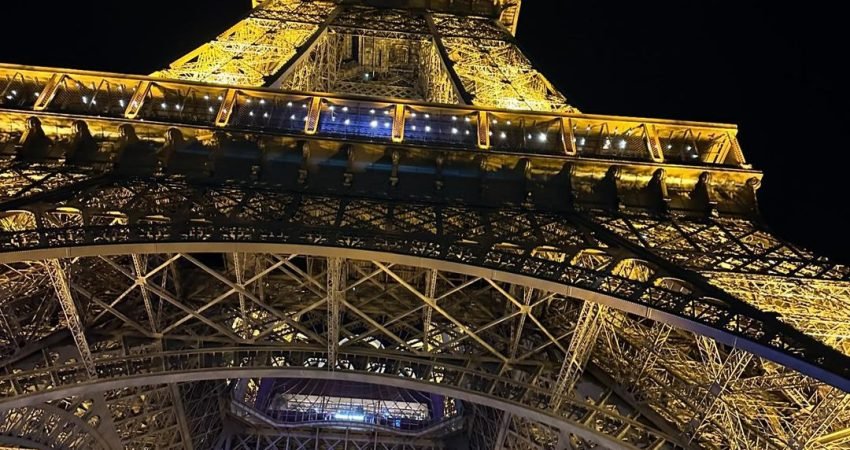
Conclusion
Overcoming the language barrier in Paris can be challenging but rewarding. Learning basic French phrases and practicing polite language etiquette will help you communicate effectively and engage yourself in the local culture.
While English is widely understood in tourist areas, making an effort to speak French is appreciated and can enhance your interactions. Use language apps, watch French films, and practice speaking to build your skills. With these tips, you’ll navigate Paris more smoothly and enjoy a richer travel experience.
Check out our blog post about COLMAR & Strasbourg for more details and tips on what to see and do there.
[Is Colmar worth visiting ( My Honest Opinion )]
[My 1 Day Visit in Colmar (By A Local)]
[A Full Guide to Visiting Colmar, France: From A Local]
[Is Strasbourg Worth Visiting? ( From A Local)]
[A Perfect Day Plan in Strasbourg (By A Local)]
[The 15 Best Things to Do in Strasbourg (With Our Recommendation)][Getting to Strasbourg]
